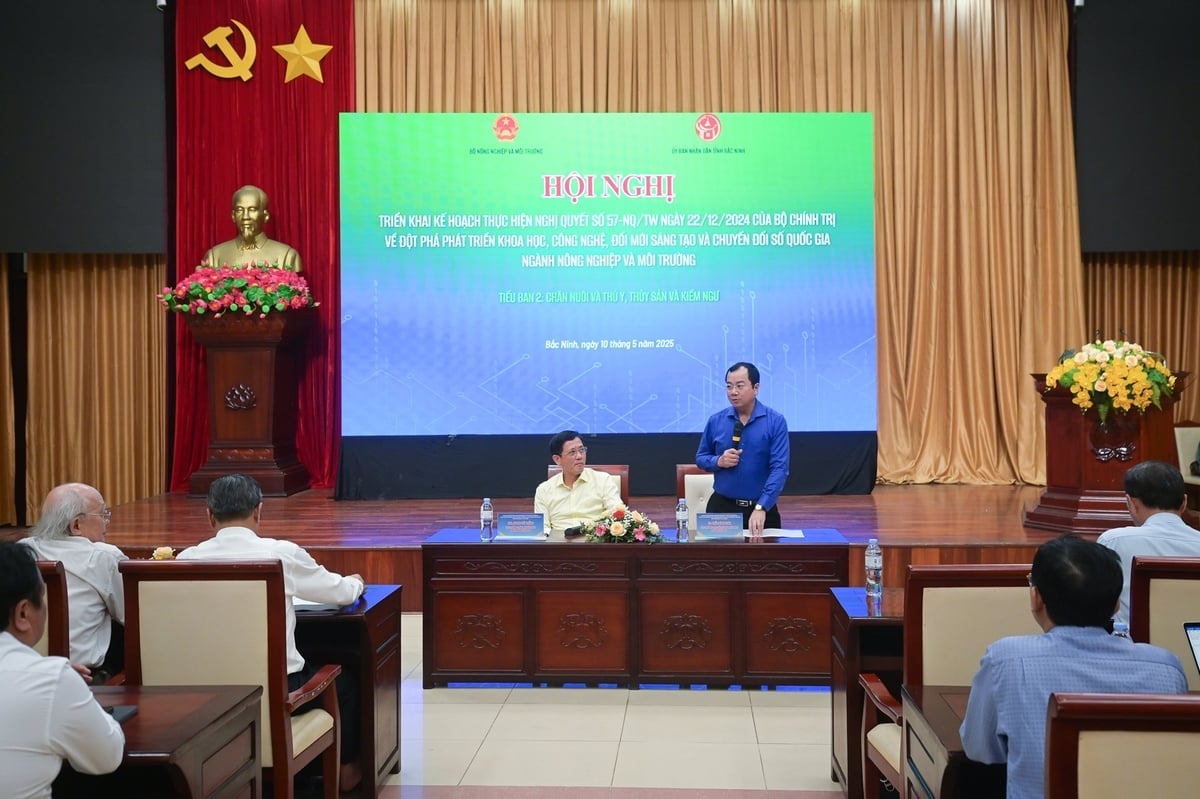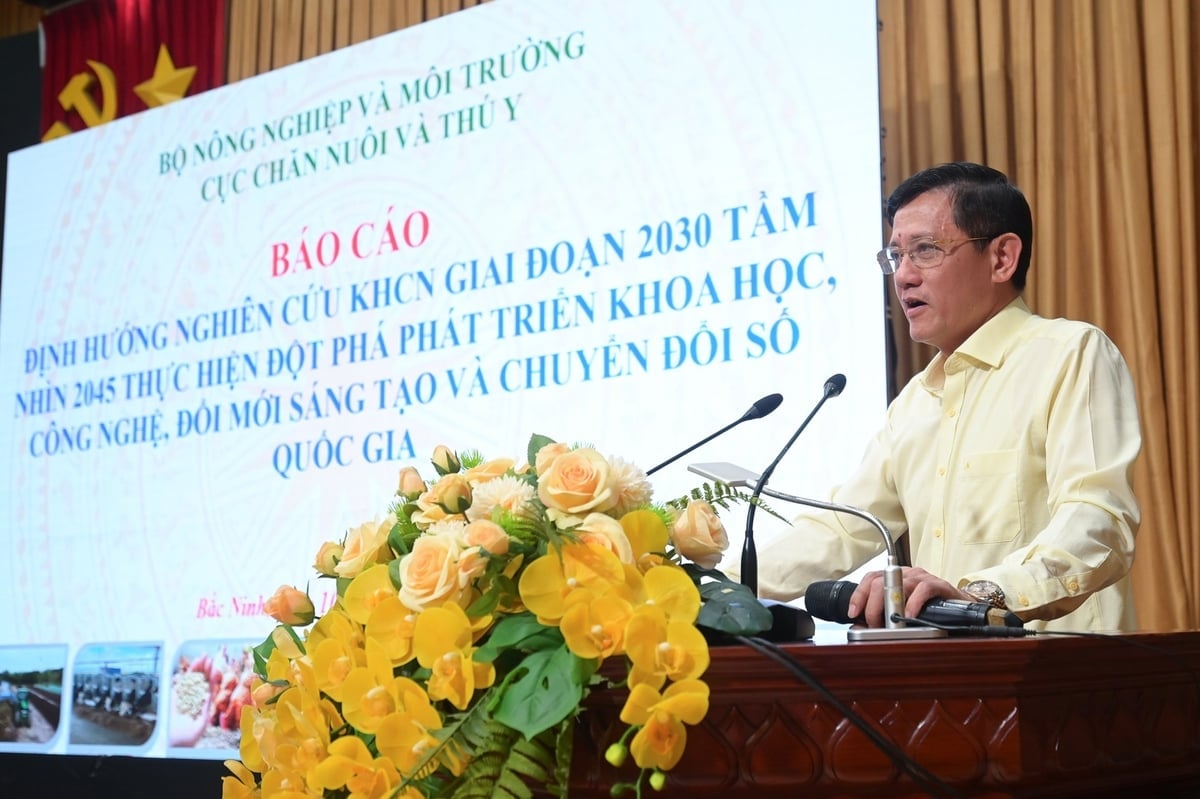December 23, 2025 | 09:21 GMT +7
December 23, 2025 | 09:21 GMT +7
Hotline: 0913.378.918
December 23, 2025 | 09:21 GMT +7
Hotline: 0913.378.918

Discussion session on livestock, veterinary, and aquaculture held on the afternoon of May 10. Photo: Tung Dinh.
As part of the Conference on the Implementation Plan for Resolution No. 57-NQ/TW, jointly organized by the Ministry of Agriculture and Environment and Bac Ninh Province, a discussion session on livestock, veterinary and aquaculture was held on the afternoon of May 10. The session focused on research orientations, policy mechanisms, the application of advanced science linked with commercialization to support the sector’s development.
Speaking on issues related to livestock and veterinary science, Mr. Duong Tat Thang, Director General of the Department of Livestock Production and Animal Health, noted that science and technology in these sectors had been prioritized from an early stage and have already achieved certain successes: “Science and technology take the lead, the government sets the foundation, businesses compete in innovation, and the people benefit."
Referring to Resolution No. 57-NQ/TW on breakthroughs in national science, technology, innovation, and digital transformation, Mr. Thang emphasized that science and technology have never received as much attention as they do now: “The livestock and veterinary sectors are keeping pace with this momentum."
According to Director General Duong Tat Thang, the livestock and veterinary sectors are currently evolving around five main pillars: Breeding, Feed, Environmental technologies, Disease prevention and control, and Slaughtering and processing. Each of these key components is being actively developed through the application of advanced science, technology, and innovation.
Regarding future research directions, Mr. Thang emphasized the focus on breeding livestock for high productivity and quality, with better resistance to diseases and adaptability to climate change.
In parallel, the animal feed processing industry will be advanced in alignment with the Prime Minister’s Master Plan on the Development of the Animal Feed Processing Industry to 2030.
As for livestock housing systems and environmental management, Mr. Thang highlighted the need to continue advancing the livestock housing industry and waste treatment solutions.
In this regard, there will be a strong emphasis on digitizing livestock farm management. The application of digital transformation will focus on the traceability of both farms and livestock products, ensuring that all processes are transparent and accountable. Additionally, cutting-edge technologies such as microbial treatments, enzymes, and nano materials will be deployed in the treatment of livestock waste and the production of organic microbial fertilizers.

Mr. Duong Tat Thang, Director General of the Department of Livestock Production and Animal Health, delivered a presentation on scientific and technological breakthroughs. Photo: Tung Dinh.
In addition, there are orientations for developing livestock science based on circular economy principles, organic farming, multi-story livestock farming, and specialty animal husbandry.
Disease diagnosis and control have been prioritized, including the development of rapid diagnostic kits, molecular testing technologies (rapid PCR, CRISPR diagnostics), and the application of AI for animal disease warning and forecasting.
Alongside these efforts, there is a push for research into new-generation vaccines, multi-valent vaccines that can prevent multiple diseases, and the development of biological veterinary drugs that are safe, antibiotic-free, and environmentally friendly.
Lastly, digital transformation in veterinary medicine will focus on the establishment of a national animal disease management system that integrates multi-source data (big data) and employs blockchain technology for traceability of animals and animal products.
To successfully implement these directions, Director General Duong Tat Thang emphasized the need to refine the institutional framework by streamlining administrative procedures, fostering breakthroughs in science and technology, innovation, efficiency, and integration. The next step is to enhance the traceability system for livestock products, including the farming area codes, slaughtering processes, and to establish a comprehensive database for environmental monitoring.
In addition, it is necessary to develop the livestock breeding industry, expand the animal feed production industry, upgrade the information management system for slaughter control, establish a centralized data management system for veterinary drug management, and finally, strengthen international cooperation.
Over the past 15 years (2010–2024), livestock productivity has increased by an estimated 5–20%, depending on the indicator. Meat production has more than doubled (from 4.0 million tons to over 8.28 million tons); egg production has tripled (from nearly 6.4 billion to 20.2 billion eggs); and fresh milk output has quadrupled (from 0.3 million tons to 1.2 million tons).
Several Vietnamese livestock products have begun to establish their value and brand recognition in international markets, including honey, suckling pigs, bird’s nests, salted duck eggs, milk, and processed chicken meat.
Many sectors within livestock and veterinary services have achieved leading positions regionally and globally. Vietnam ranks 5th in pig population and 6th in pork production; 2nd worldwide in waterfowl population (over 100 million birds); 3rd in ASEAN for fresh milk production; and 1st in Southeast Asia (12th globally) for industrial animal feed output, with 21.5 million tons.
Translated by Phuong Linh

(VAN) The 2025 Joint Response Plan (JRP) identifies three core priorities and calls for $96.2 million to support disaster recovery for 1.4 million people.

(VAN) Risk assessment methodology enables early risk identification, rational resource allocation, and the development of control measures tailored to the food value chain.

(VAN) Once considered a waste product to be burned, rice straw in the Mekong Delta is now being collected and processed through mechanization and biotechnology, paving the way for a sustainable circular agricultural model.

(VAN) Risk assessment in food safety management not only helps protect public health but also promotes sustainable development.

(VAN) Prime Minister chaired the 26th meeting of the National Steering Committee on Illegal, Unreported, and Unregulated (IUU) Fishing.

(VAN) Cuba is currently streamlining procedures to attract investors, with many new policies shaped by the practical experiences of Vietnamese projects operating in the country.

(VAN) Patrol Team No. 15 has been executing patrol, inspection, and control duties in the Southwest waters, a region identified as having a high risk of violations.